Whistleblowing Ethics: Deontology, Utilitarianism & Conduct Codes
VerifiedAdded on 2023/06/11
|5
|1288
|434
Essay
AI Summary
This essay delves into the ethical complexities surrounding whistleblowing, particularly within organizational contexts. It begins by defining whistleblowing as the revelation of illicit information that poses a threat to the public interest, often facilitated by modern technology like social media. The essay argues that accessing someone's information without consent is unethical, drawing upon ethical theories such as deontology, which emphasizes duty and non-interference, and utilitarianism, which focuses on maximizing overall welfare, to support this claim. It further discusses the importance of professional codes of conduct in preventing employees from accessing illicit information, highlighting virtues like honesty and integrity. The essay concludes that whistleblowing is generally an unethical activity, supported by both ethical theories and the principles embedded in professional codes of conduct, while acknowledging the tension between organizational loyalty and public interest.
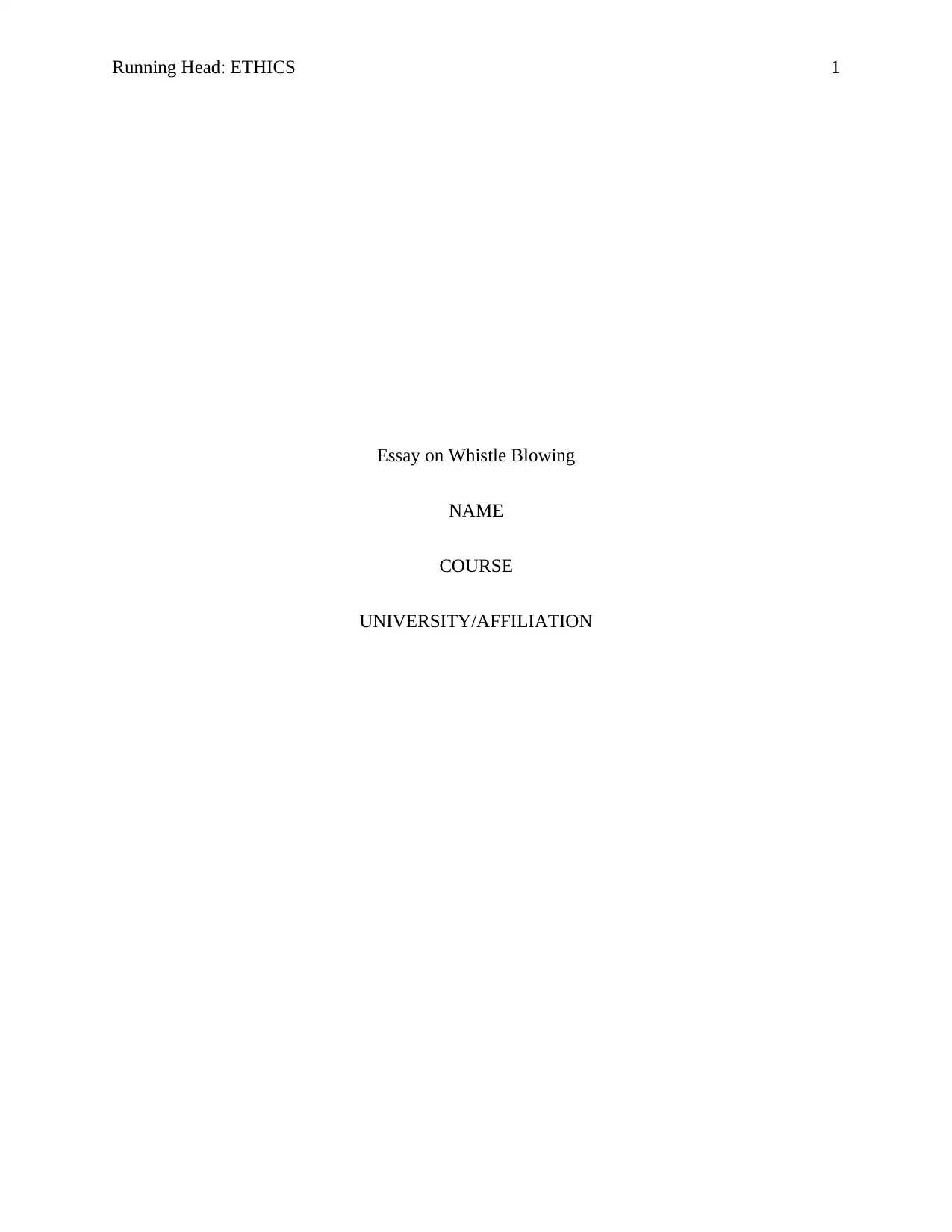
Running Head: ETHICS 1
Essay on Whistle Blowing
NAME
COURSE
UNIVERSITY/AFFILIATION
Essay on Whistle Blowing
NAME
COURSE
UNIVERSITY/AFFILIATION
Paraphrase This Document
Need a fresh take? Get an instant paraphrase of this document with our AI Paraphraser
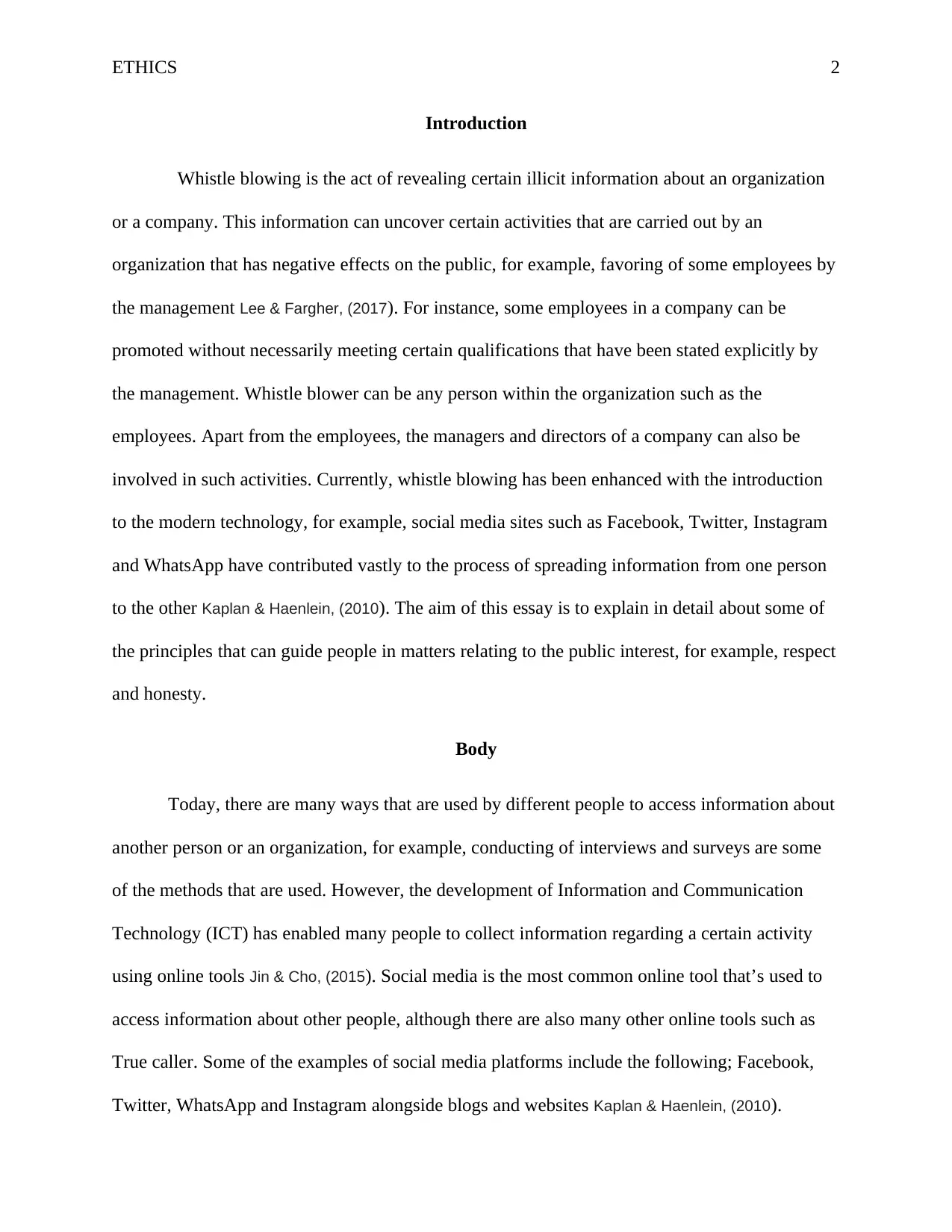
ETHICS 2
Introduction
Whistle blowing is the act of revealing certain illicit information about an organization
or a company. This information can uncover certain activities that are carried out by an
organization that has negative effects on the public, for example, favoring of some employees by
the management Lee & Fargher, (2017). For instance, some employees in a company can be
promoted without necessarily meeting certain qualifications that have been stated explicitly by
the management. Whistle blower can be any person within the organization such as the
employees. Apart from the employees, the managers and directors of a company can also be
involved in such activities. Currently, whistle blowing has been enhanced with the introduction
to the modern technology, for example, social media sites such as Facebook, Twitter, Instagram
and WhatsApp have contributed vastly to the process of spreading information from one person
to the other Kaplan & Haenlein, (2010). The aim of this essay is to explain in detail about some of
the principles that can guide people in matters relating to the public interest, for example, respect
and honesty.
Body
Today, there are many ways that are used by different people to access information about
another person or an organization, for example, conducting of interviews and surveys are some
of the methods that are used. However, the development of Information and Communication
Technology (ICT) has enabled many people to collect information regarding a certain activity
using online tools Jin & Cho, (2015). Social media is the most common online tool that’s used to
access information about other people, although there are also many other online tools such as
True caller. Some of the examples of social media platforms include the following; Facebook,
Twitter, WhatsApp and Instagram alongside blogs and websites Kaplan & Haenlein, (2010).
Introduction
Whistle blowing is the act of revealing certain illicit information about an organization
or a company. This information can uncover certain activities that are carried out by an
organization that has negative effects on the public, for example, favoring of some employees by
the management Lee & Fargher, (2017). For instance, some employees in a company can be
promoted without necessarily meeting certain qualifications that have been stated explicitly by
the management. Whistle blower can be any person within the organization such as the
employees. Apart from the employees, the managers and directors of a company can also be
involved in such activities. Currently, whistle blowing has been enhanced with the introduction
to the modern technology, for example, social media sites such as Facebook, Twitter, Instagram
and WhatsApp have contributed vastly to the process of spreading information from one person
to the other Kaplan & Haenlein, (2010). The aim of this essay is to explain in detail about some of
the principles that can guide people in matters relating to the public interest, for example, respect
and honesty.
Body
Today, there are many ways that are used by different people to access information about
another person or an organization, for example, conducting of interviews and surveys are some
of the methods that are used. However, the development of Information and Communication
Technology (ICT) has enabled many people to collect information regarding a certain activity
using online tools Jin & Cho, (2015). Social media is the most common online tool that’s used to
access information about other people, although there are also many other online tools such as
True caller. Some of the examples of social media platforms include the following; Facebook,
Twitter, WhatsApp and Instagram alongside blogs and websites Kaplan & Haenlein, (2010).
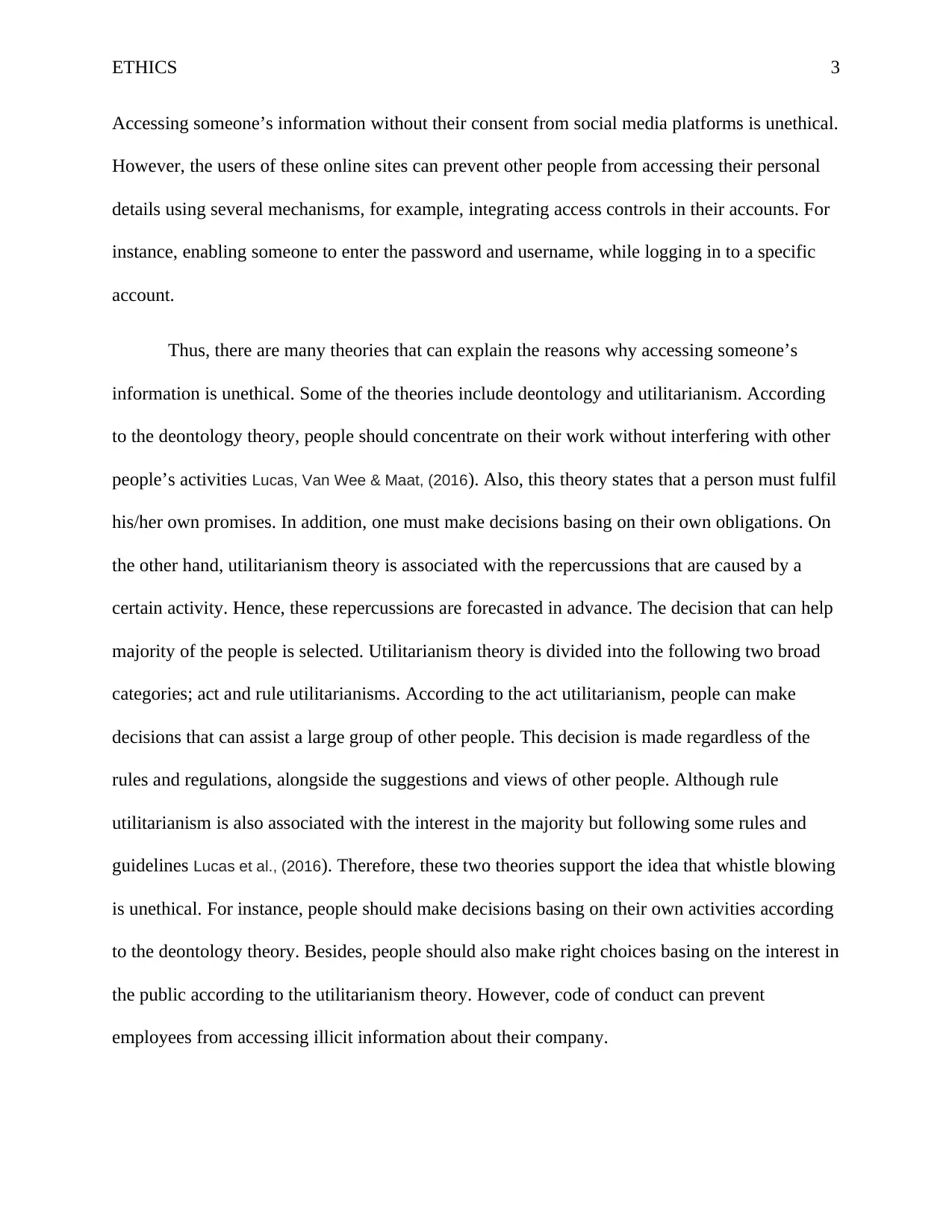
ETHICS 3
Accessing someone’s information without their consent from social media platforms is unethical.
However, the users of these online sites can prevent other people from accessing their personal
details using several mechanisms, for example, integrating access controls in their accounts. For
instance, enabling someone to enter the password and username, while logging in to a specific
account.
Thus, there are many theories that can explain the reasons why accessing someone’s
information is unethical. Some of the theories include deontology and utilitarianism. According
to the deontology theory, people should concentrate on their work without interfering with other
people’s activities Lucas, Van Wee & Maat, (2016). Also, this theory states that a person must fulfil
his/her own promises. In addition, one must make decisions basing on their own obligations. On
the other hand, utilitarianism theory is associated with the repercussions that are caused by a
certain activity. Hence, these repercussions are forecasted in advance. The decision that can help
majority of the people is selected. Utilitarianism theory is divided into the following two broad
categories; act and rule utilitarianisms. According to the act utilitarianism, people can make
decisions that can assist a large group of other people. This decision is made regardless of the
rules and regulations, alongside the suggestions and views of other people. Although rule
utilitarianism is also associated with the interest in the majority but following some rules and
guidelines Lucas et al., (2016). Therefore, these two theories support the idea that whistle blowing
is unethical. For instance, people should make decisions basing on their own activities according
to the deontology theory. Besides, people should also make right choices basing on the interest in
the public according to the utilitarianism theory. However, code of conduct can prevent
employees from accessing illicit information about their company.
Accessing someone’s information without their consent from social media platforms is unethical.
However, the users of these online sites can prevent other people from accessing their personal
details using several mechanisms, for example, integrating access controls in their accounts. For
instance, enabling someone to enter the password and username, while logging in to a specific
account.
Thus, there are many theories that can explain the reasons why accessing someone’s
information is unethical. Some of the theories include deontology and utilitarianism. According
to the deontology theory, people should concentrate on their work without interfering with other
people’s activities Lucas, Van Wee & Maat, (2016). Also, this theory states that a person must fulfil
his/her own promises. In addition, one must make decisions basing on their own obligations. On
the other hand, utilitarianism theory is associated with the repercussions that are caused by a
certain activity. Hence, these repercussions are forecasted in advance. The decision that can help
majority of the people is selected. Utilitarianism theory is divided into the following two broad
categories; act and rule utilitarianisms. According to the act utilitarianism, people can make
decisions that can assist a large group of other people. This decision is made regardless of the
rules and regulations, alongside the suggestions and views of other people. Although rule
utilitarianism is also associated with the interest in the majority but following some rules and
guidelines Lucas et al., (2016). Therefore, these two theories support the idea that whistle blowing
is unethical. For instance, people should make decisions basing on their own activities according
to the deontology theory. Besides, people should also make right choices basing on the interest in
the public according to the utilitarianism theory. However, code of conduct can prevent
employees from accessing illicit information about their company.
⊘ This is a preview!⊘
Do you want full access?
Subscribe today to unlock all pages.

Trusted by 1+ million students worldwide
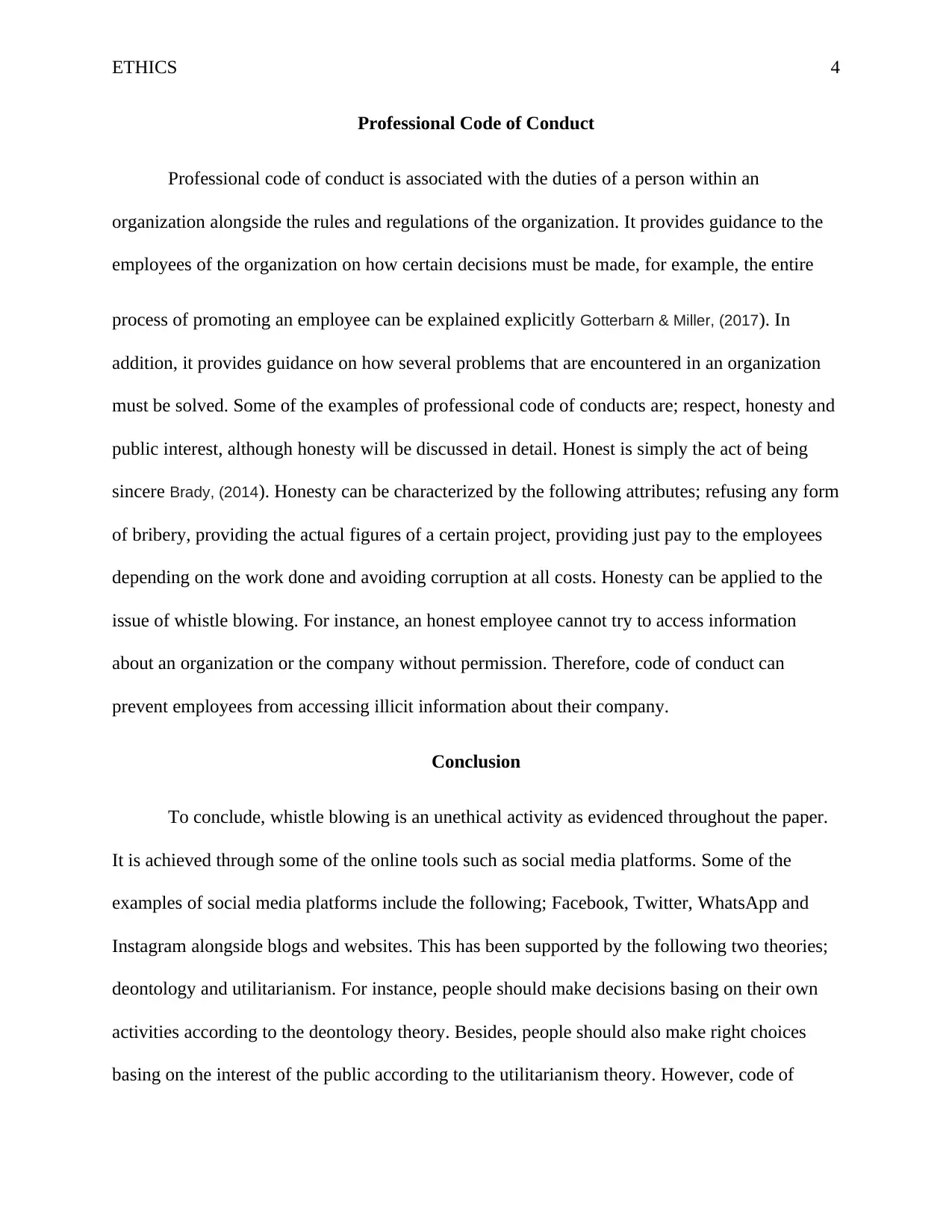
ETHICS 4
Professional Code of Conduct
Professional code of conduct is associated with the duties of a person within an
organization alongside the rules and regulations of the organization. It provides guidance to the
employees of the organization on how certain decisions must be made, for example, the entire
process of promoting an employee can be explained explicitly Gotterbarn & Miller, (2017). In
addition, it provides guidance on how several problems that are encountered in an organization
must be solved. Some of the examples of professional code of conducts are; respect, honesty and
public interest, although honesty will be discussed in detail. Honest is simply the act of being
sincere Brady, (2014). Honesty can be characterized by the following attributes; refusing any form
of bribery, providing the actual figures of a certain project, providing just pay to the employees
depending on the work done and avoiding corruption at all costs. Honesty can be applied to the
issue of whistle blowing. For instance, an honest employee cannot try to access information
about an organization or the company without permission. Therefore, code of conduct can
prevent employees from accessing illicit information about their company.
Conclusion
To conclude, whistle blowing is an unethical activity as evidenced throughout the paper.
It is achieved through some of the online tools such as social media platforms. Some of the
examples of social media platforms include the following; Facebook, Twitter, WhatsApp and
Instagram alongside blogs and websites. This has been supported by the following two theories;
deontology and utilitarianism. For instance, people should make decisions basing on their own
activities according to the deontology theory. Besides, people should also make right choices
basing on the interest of the public according to the utilitarianism theory. However, code of
Professional Code of Conduct
Professional code of conduct is associated with the duties of a person within an
organization alongside the rules and regulations of the organization. It provides guidance to the
employees of the organization on how certain decisions must be made, for example, the entire
process of promoting an employee can be explained explicitly Gotterbarn & Miller, (2017). In
addition, it provides guidance on how several problems that are encountered in an organization
must be solved. Some of the examples of professional code of conducts are; respect, honesty and
public interest, although honesty will be discussed in detail. Honest is simply the act of being
sincere Brady, (2014). Honesty can be characterized by the following attributes; refusing any form
of bribery, providing the actual figures of a certain project, providing just pay to the employees
depending on the work done and avoiding corruption at all costs. Honesty can be applied to the
issue of whistle blowing. For instance, an honest employee cannot try to access information
about an organization or the company without permission. Therefore, code of conduct can
prevent employees from accessing illicit information about their company.
Conclusion
To conclude, whistle blowing is an unethical activity as evidenced throughout the paper.
It is achieved through some of the online tools such as social media platforms. Some of the
examples of social media platforms include the following; Facebook, Twitter, WhatsApp and
Instagram alongside blogs and websites. This has been supported by the following two theories;
deontology and utilitarianism. For instance, people should make decisions basing on their own
activities according to the deontology theory. Besides, people should also make right choices
basing on the interest of the public according to the utilitarianism theory. However, code of
Paraphrase This Document
Need a fresh take? Get an instant paraphrase of this document with our AI Paraphraser
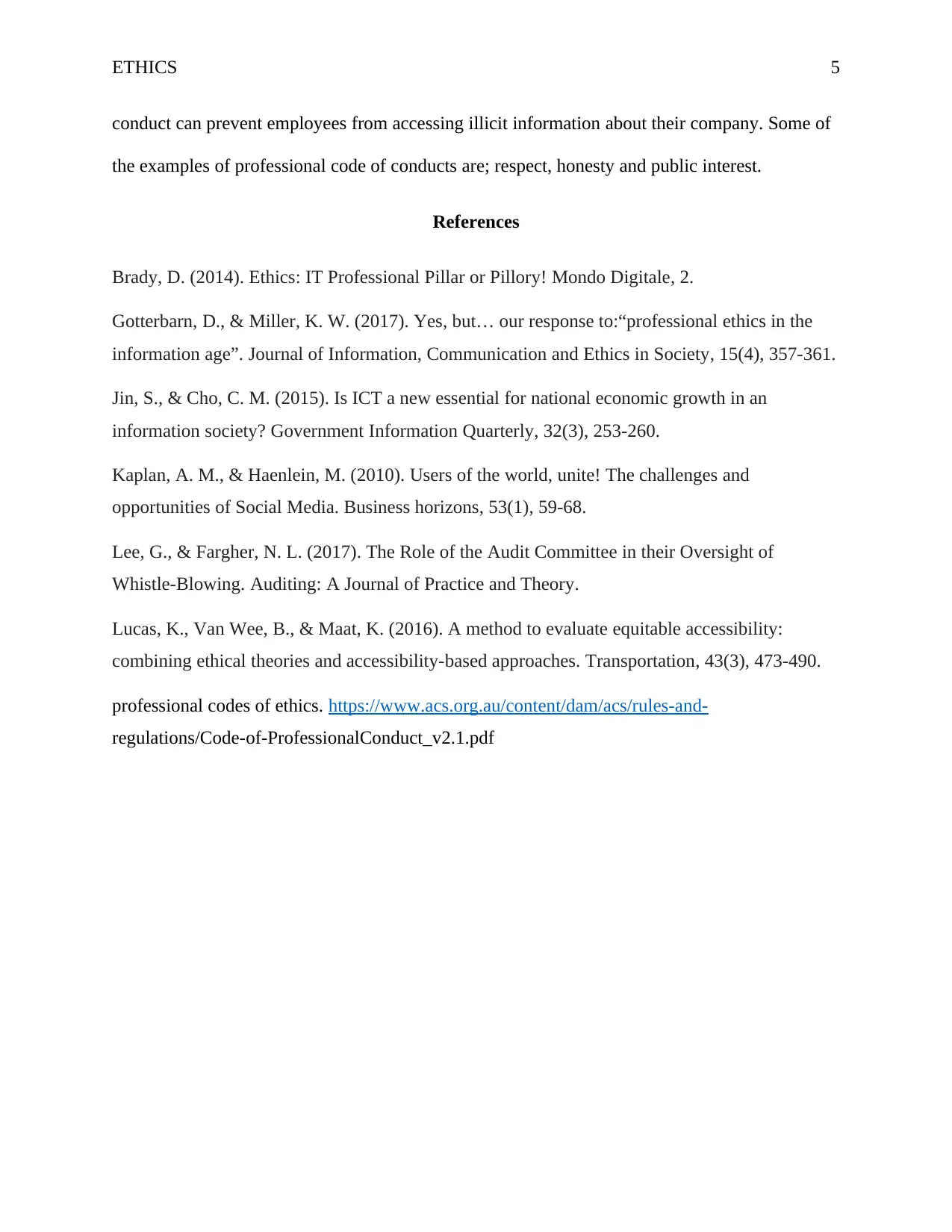
ETHICS 5
conduct can prevent employees from accessing illicit information about their company. Some of
the examples of professional code of conducts are; respect, honesty and public interest.
References
Brady, D. (2014). Ethics: IT Professional Pillar or Pillory! Mondo Digitale, 2.
Gotterbarn, D., & Miller, K. W. (2017). Yes, but… our response to:“professional ethics in the
information age”. Journal of Information, Communication and Ethics in Society, 15(4), 357-361.
Jin, S., & Cho, C. M. (2015). Is ICT a new essential for national economic growth in an
information society? Government Information Quarterly, 32(3), 253-260.
Kaplan, A. M., & Haenlein, M. (2010). Users of the world, unite! The challenges and
opportunities of Social Media. Business horizons, 53(1), 59-68.
Lee, G., & Fargher, N. L. (2017). The Role of the Audit Committee in their Oversight of
Whistle-Blowing. Auditing: A Journal of Practice and Theory.
Lucas, K., Van Wee, B., & Maat, K. (2016). A method to evaluate equitable accessibility:
combining ethical theories and accessibility-based approaches. Transportation, 43(3), 473-490.
professional codes of ethics. https://www.acs.org.au/content/dam/acs/rules-and-
regulations/Code-of-ProfessionalConduct_v2.1.pdf
conduct can prevent employees from accessing illicit information about their company. Some of
the examples of professional code of conducts are; respect, honesty and public interest.
References
Brady, D. (2014). Ethics: IT Professional Pillar or Pillory! Mondo Digitale, 2.
Gotterbarn, D., & Miller, K. W. (2017). Yes, but… our response to:“professional ethics in the
information age”. Journal of Information, Communication and Ethics in Society, 15(4), 357-361.
Jin, S., & Cho, C. M. (2015). Is ICT a new essential for national economic growth in an
information society? Government Information Quarterly, 32(3), 253-260.
Kaplan, A. M., & Haenlein, M. (2010). Users of the world, unite! The challenges and
opportunities of Social Media. Business horizons, 53(1), 59-68.
Lee, G., & Fargher, N. L. (2017). The Role of the Audit Committee in their Oversight of
Whistle-Blowing. Auditing: A Journal of Practice and Theory.
Lucas, K., Van Wee, B., & Maat, K. (2016). A method to evaluate equitable accessibility:
combining ethical theories and accessibility-based approaches. Transportation, 43(3), 473-490.
professional codes of ethics. https://www.acs.org.au/content/dam/acs/rules-and-
regulations/Code-of-ProfessionalConduct_v2.1.pdf
1 out of 5
Related Documents
Your All-in-One AI-Powered Toolkit for Academic Success.
+13062052269
info@desklib.com
Available 24*7 on WhatsApp / Email
![[object Object]](/_next/static/media/star-bottom.7253800d.svg)
Unlock your academic potential
Copyright © 2020–2025 A2Z Services. All Rights Reserved. Developed and managed by ZUCOL.





